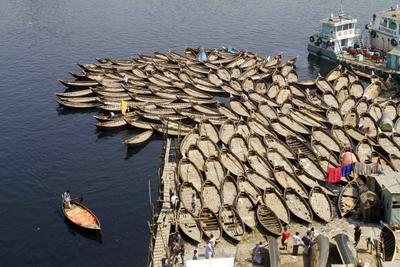The past few years have seen a concerted effort to sustain liberal democracy in Bangladesh by improving institutional performance and promoting greater transparency. But Bangladesh is currently experiencing internal power struggles between the two dominant political parties, which threaten to destabilise the country’s democratic system. So while Bangladesh’s achievements should be recognised — including its fight against poverty and rampant corruption in an effort to achieve the Millennium Development Goals — the challenges still posed to democracy and good governance should not be underestimated.
A period of military-backed emergency rule ended with a landslide victory for the Awami League (AL) alliance, led by the current prime minister, Sheikh Hasina, in the parliamentary elections of 29 December 2008. This election restored democratic government after two long years of emergency rule by a non-party caretaker government. Nevertheless, domestic politics is now heading toward a bitter political confrontation over the next general election which is due to take place in late 2013 or early 2014. The political uncertainty began when the ruling party-dominated parliament unilaterally abolished the caretaker system in June 2011. The opposition parties, led by Khaleda Zia’s Bangladesh Nationalist Party (BNP), have opposed this contentious decision, and this has led to street protests demanding restoration of the caretaker system.
The confrontational political atmosphere, and the mutual abhorrence between Khaleda and Hasina, has become a hindrance in Bangladesh’s pursuit to consolidate democracy and representative government. The BNP-led mass rally on 12 March 2012, which demanded a return to the caretaker system, has unsettled many at home and abroad because of the way the ruling grand alliance handled law and order on the day. In order to dismiss and disrupt the protestors, the Hasina government took drastic measures to isolate Dhaka, restricting travel along key roads and waterways. The AL alliance even went as far as involving party activists in law enforcement activities, including the unlawful search and seizure of citizens at various points throughout Dhaka. As these events show, political volatility has the potential to further decay Bangladesh’s democracy.
Bangladesh’s political leaders must come to a resolution, finding a way to peacefully and fairly conduct the next general election and steer the country toward a practice of stable democratic changes of government. Democracy requires a politics of accommodation and compromise, but this appears to be missing among the dominant political parties in Bangladesh. Given the diversity of interests represented by these political parties, the ability to compromise is essential, and democratic failure often seems inevitable. But the parties must learn from the dark history of past military governments. Democracy has been distorted in Bangladesh’s highly polarised society, divided as it is by income, class and political stance. Political parties in Bangladesh continue to be dominated by religion and family, and senior positions within the parties are rarely awarded on the basis of merit.
Extended caretaker rule, from 2007 to 2008, and abortive military intervention through an attempted coup in January 2012 are notable examples of the fragility of democracy in Bangladesh. Unless democratisation of the political parties takes place first, their leaders are unlikely to behave democratically in parliament — instead, they will continue to promote their coterie’s interests rather than the interests of the wider public. But with greater political will from its leaders and elites, Bangladesh could implement home-grown institutional reforms, based on the country’s indigenous governance process, to address local needs and demands.
To this end, the democratic system needs to be reassessed in the light of Bangladesh’s historical notion of governance, its political culture and its colonial legacy. This assessment must go beyond the current rhetoric of liberal democracy, and recommend steps toward institutionalising meaningful checks and balances on power. Unfortunately, this balanced approach is largely absent in the contemporary democratic practices of Bangladesh.
Syeda Naushin Parnini is Senior Lecturer at the Department of International and Strategic Studies, University of Malaya, Malaysia.

